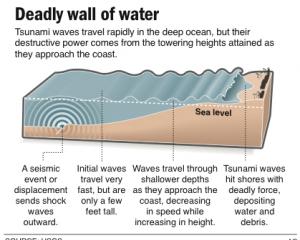That is the question to be answered when civil defence, police and other groups are debriefed in the weeks ahead.
Campers at Hampden and some South Otago residents fled to higher ground over fears they were at risk, while some St Clair surfers ignored police advice and carried on surfing.
Civil defence offices in North Otago and South Otago were manned through the night while Dunedin City Council civil defence manager Neil Brown spent the night dealing with the issue from home.
And, in the end, the tsunami created no more than a barely noticeable "surge" along the Otago coast of between 10cm-30cm.
Emergency response group manager Inspector Alistair Dickie, of Dunedin, said police who patrolled beaches between Taieri Mouth and Waikouaiti warning people of the risk, could force people to move "but it wasn't at that stage".
"We were working on information of possibilities so we were just really giving people advice."
He would not comment on whether there was a difference between police and civil defence thinking over the level of risk.
"Some people might think it was an overkill but I stand by my decision to take the action we did and we will do it again if it happens again."
Mr Brown put out a "tsunami warning" at 12.38am referring to a "non-destructive" tsunami of up to 1m from 8.30am "at which time it will be approximately half-tide on a falling tide, so no damage is expected".
Otago Daily Times inquiries show it is unlikely the Dunedin warning was broadcast before 6am.
The Radio Network takes an Auckland feed early on Sunday morning and Radioworks operates "on auto" from midnight until 6am.
Dunedin Mediaworks general manager Cindy Davies said its arrangement with civil defence authorities is that three staff are "on call" and will ensure local broadcasts are made, if required.
No request was made yesterday.
Mr Brown said he did not think the situation warranted civil defence "going to our back-up procedures and asking radio stations to activate out of their normal hours".
He considered that broadcasting the warning from 6am gave the public sufficient warning.
"We did what was appropriate in the level of risk, bearing in mind there was no risk of tsunami inundation in Dunedin."
Ms Davies said Mr Brown went on air twice to explain "there wasn't a major problem" and the company also broadcast the Dunedin warning across all its brands until 5pm.
Advertisement




